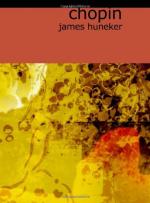Then came the last blow: he was asked by a music seller for his portrait, which he refused, having no desire, he said with a shiver, to see his face on cheese and butter wrappers. Some of the criticisms were glowing, others absurd as criticisms occasionally are. Chopin wrote to Titus the same rhapsodical protestations and finally declared in meticulous peevishness, “I will no longer read what people write about me.” This has the familiar ring of the true artist who cares nothing for the newspapers but reads them religiously after his own and his rivals’ concerts.
Chopin heard Henrietta Sontag with great joy; he was ever a lover and a connoisseur of singing. He advised young pianists to listen carefully and often to great singers. Mdlle. de Belleville the pianist and Lipinski the violinist were admired, and he could write a sound criticism when he chose. But the Gladowska is worrying him. “Unbearable longing” is driving him to exile. He attends her debut as Agnese in Paer’s opera of that title and writes a complete description of the important function to Titus, who is at his country seat where Chopin visits him betimes. Agitated, he thinks of going to Berlin or Vienna, but after much philandering remains in Warsaw. On October 11, 1830, following many preparations and much emotional shilly-shallying, Chopin gave his third and last Warsaw concert. He played the E minor concerto for the first time in public but not in sequence. The first and last two movements were separated by an aria, such being the custom of those days. Later he gave the Fantasia on Polish airs. Best of all for him, Miss Gladowska sang a Rossini air, “wore a white dress and roses in her hair, and was charmingly beautiful.” Thus Chopin; and the details have all the relevancy of a male besieged by Dan Cupid. Chopin must have played well. He said so himself, and he was always a cautious self-critic despite his




